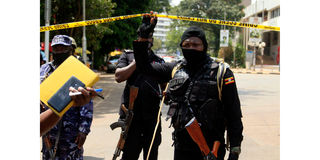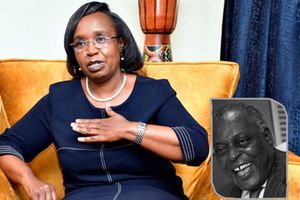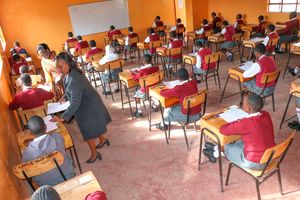Uganda police kill 5 suspects as attacks probe widens

Police cordons off the crime scene at Parliament Avenue.
Uganda police shot dead five suspects and arrested 21 people Thursday, an official said, as part of an investigation into twin suicide bombings claimed by the Islamic State group that killed four people.
Tuesday's explosions were the latest in a string of attacks in the East African country, which has tightened security and mounted an investigation into the bombings, with President Yoweri Museveni vowing to defeat "the terrorists".
The attacks in the capital Kampala occurred within minutes of each other, with two suicide bombers on motorbikes disguised as "boda boda" motorcycle taxi drivers detonating a device near parliament, while a third attacker targeted a checkpoint near the central police station.
Ugandan police said the attacks were the work of "domestic terrorists" linked to the Allied Democratic Forces (ADF), an armed group active in eastern Democratic Republic of Congo that the United States has linked to IS.
On Thursday, counter-terrorism officers in the west of the country killed "four suspected terrorists in Ntoroko who were crossing back to DRC", police spokesman Fred Enanga told a press conference.
A fifth man was killed near the capital as he tried to escape arrest, Enanga said, adding that Sheikh Abas Muhamed Kirevu was a local Islamic leader who was "responsible for re-awakening the terror cells in Kampala".
He said police had arrested 21 suspects as part of their crackdown on the ADF, which Kampala also blames for two attacks last month.
The suspects "were operatives, coordinators, financiers of terrorism activities," Enanga added.
Police last month arrested a number of alleged ADF operatives and warned that extremists were believed to be plotting a new attack on "major installations".
The arrests followed a bus explosion near Kampala that wounded many people and a bombing at a roadside eatery in the capital that killed one woman.
Washington in March linked the ADF to IS, which in 2019 began to claim some ADF attacks on social media, presenting the group as its regional branch -- the Islamic State Central Africa Province, or ISCAP.
The ADF, historically a Ugandan rebel group, has been accused of killing thousands of civilians in eastern DRC.
Kristof Titeca, an academic and expert on the group, has said it is "increasingly clear that the ADF is refocusing its attention on Uganda".
He has said it could be related to "an increased influence of jihadist elements within the ADF in the last couple of years".
Experts consider the ADF to be the bloodiest of more than 120 armed groups that roam eastern DRC, many of them a legacy of two regional wars a quarter of a century ago.





